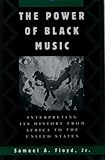The power of Black music : interpreting its history from Africa to the United States / Samuel A. Floyd, Jr.
Material type: TextPublication details: New York : Oxford University Press, c1995.Description: 316 p. : ill. ; 25 cmISBN:
TextPublication details: New York : Oxford University Press, c1995.Description: 316 p. : ill. ; 25 cmISBN: - 0195082354
- 9780195082357
- 780/.89/96073
- ML 3556 F645p 1995
| Item type | Current library | Home library | Collection | Shelving location | Call number | Vol info | Copy number | Status | Date due | Barcode |
|---|---|---|---|---|---|---|---|---|---|---|
 Libro
Libro
|
Biblioteca Juan Bosch | Biblioteca Juan Bosch | Humanidades | Humanidades (4to. Piso) | ML 3556 F645p 1995 (Browse shelf(Opens below)) | 1 | 1 | Available | 00000062508 |
Browsing Biblioteca Juan Bosch shelves, Shelving location: Humanidades (4to. Piso), Collection: Humanidades Close shelf browser (Hides shelf browser)

|

|

|

|

|

|
No cover image available | ||
| ML 3535.5 A639l 1998 Listening to salsa : gender, Latin popular music, and Puerto Rican cultures / | ML3549 S159t 2005 Todas las voces : América / | ML3556 African American music : a philosophical look at African American music in society / | ML 3556 F645p 1995 The power of Black music : interpreting its history from Africa to the United States / | ML 3565 C162m 2008 The Man...The Music : a pictorial journey / | ML3565 .P558p 2009 The political calypso : a sociolinguistic process of conflict transformation / | ML3575.A2 F825 1974 Basta! Canciones de testimonio y rebeldìa de América Latina. |
Includes bibliographical references (p. 279-295), discography (p. 297-304), filmography (p. 305), and index.
1. African Music, Religion, and Narrative -- 2. Transformations -- 3. Syncretization and Synthesis: Folk and Written Traditions -- 4. African-American Modernism, Signifyin(g), and Black Music -- 5. The Negro Renaissance: Harlem and Chicago Flowerings -- 6. Transitions: Function and Difference in Myth and Ritual -- 7. Continuity and Discontinuity: The Fifties -- 8. The Sixties and After -- 9. Troping the Blues: From Spirituals to the Concert Hall -- 10. The Object of Call-Response: The Signifyin(g) Symbol -- 11. Implications and Conclusions.
Bold and original, The Power of Black Music offers a new way of listening to the music of black America, and appreciating its profound contribution to all American music. Striving to break down the barriers that remain between high art and low art, it brilliantly illuminates the centuries-old linkage between the music, myths, and rituals of Africa and the continuing evolution and enduring vitality of African-American music. Inspired by the pioneering work of Sterling Stuckey and Henry Louis Gates, Jr., author Samuel A. Floyd, Jr., advocates a new critical approach grounded in the forms and traditions of the music itself. He accompanies readers on a fascinating journey from the African ring, through the ring shout's powerful merging of music and dance in the slave culture, to the funeral parade practices of the early New Orleans jazzmen, the bluesmen in the twenties, the beboppers in the forties, and the free jazz, rock, Motown, and concert hall composers of the sixties and beyond.
Floyd dismisses the assumption that Africans brought to the United States as slaves took the music of whites in the New World and transformed it through their own performance practices. Instead, he recognizes European influences, while demonstrating how much black music has continued to share with its African counterparts. Floyd maintains that while African Americans may not have direct knowledge of African traditions and myths, they can intuitively recognize links to an authentic African cultural memory.


There are no comments on this title.